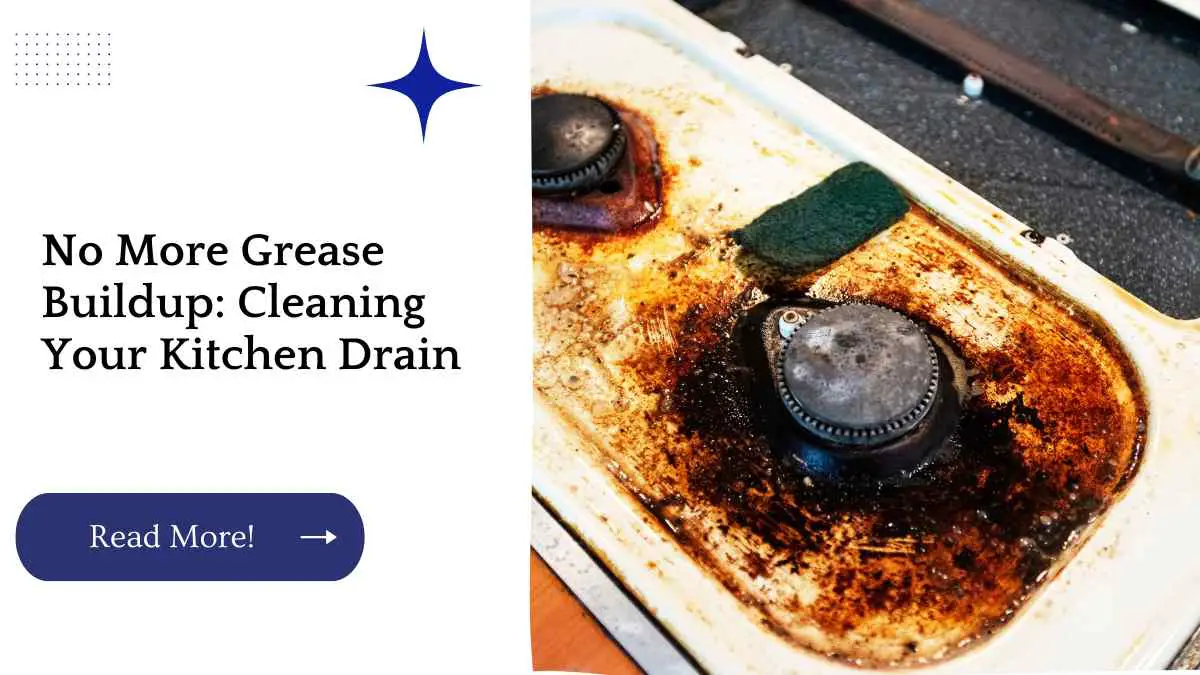Grease buildup in the kitchen drain can cause clogs and other plumbing issues, leading to unpleasant odors and water backups.
Cleaning your kitchen drain regularly can help prevent these issues and keep your kitchen functioning properly. In this article, we’ll explore the causes of grease buildup in your kitchen drain, signs of a clogged drain, and various methods to clean your kitchen drain.
| Key Takeaways |
|---|
| Grease buildup in the kitchen drain can cause clogs and other plumbing issues. |
| Signs of a clogged drain include slow drainage, unpleasant odors, and water backups. |
| To clean your kitchen drain, you’ll need boiling water, baking soda, vinegar, a plunger, and a drain snake. |
| Prevention is key when it comes to grease buildup in your kitchen drain. |
| Never pour grease, oil, or fat down the drain. |
| Use hot water to wash dishes, as this will help prevent grease and oil buildup in the pipes. |
| Use a strainer over your sink drain to catch any food scraps or other debris that can contribute to clogs. |
| Clean your kitchen drain regularly to prevent grease and oil buildup from causing clogs and other plumbing issues. |
What Causes Grease Buildup?
One of the most common causes of kitchen drain clogs is the buildup of grease and oil. When you cook, grease and oil can accumulate in the drain and stick to the walls of the pipes. Over time, this buildup can cause the pipes to narrow, leading to slow drainage and eventually complete blockages.
Signs of a Clogged Drain
There are several signs that your kitchen drain may be clogged, including:
- Slow drainage: water takes longer than usual to drain from the sink.
- Unpleasant odors: a foul smell coming from your sink or drain.
- Water backups: water backing up into your sink, dishwasher, or other appliances connected to your kitchen drain.
Upgrading your garbage disposal can be a simple solution to prevent future clogs and backups in your kitchen sink. Follow our DIY installation tips to make the process a breeze.” Check out our guide on garbage disposal upgrade tips to learn more!
Tools You Will Need
To clean your kitchen drain, you will need:
- Boiling water
- Baking soda
- Vinegar
- Plunger
- Drain snake
How to Clean a Kitchen Drain
Here are the steps to clean your kitchen drain:
Step 1: Boil Hot Water
Boil a large pot of water on the stove. The water should be enough to fill your sink halfway.
Step 2: Pour Hot Water Down the Drain
Slowly pour the boiling water down the drain. This will help loosen any grease or oil buildup.
Step 3: Use Baking Soda and Vinegar
Mix 1/2 cup of baking soda and 1/2 cup of vinegar. Pour the mixture down the drain and let it sit for 15-20 minutes. The baking soda and vinegar will react with the grease and oil buildup in the pipes, causing a chemical reaction that helps break down the buildup.
Looking for a way to brighten up your kitchen space? Installing under-cabinet lighting is an easy and affordable way to achieve a warm and inviting feel. Follow our step-by-step guide on DIY under-cabinet lighting installation to learn how!
Step 4: Use a Plunger
Place a plunger over the drain and vigorously pump up and down several times. This will help dislodge any remaining grease and oil buildup.
Step 5: Use a Drain Snake
If the plunger doesn’t work, try using a drain snake. Insert the snake into the drain and twist it until it reaches the clog. Then, use a back-and-forth motion to dislodge the clog.
Step 6: Call a Professional
If none of the above methods work, it’s time to call a professional plumber. A plumber will have the tools and expertise to remove even the toughest grease buildup.
Choosing the right drainage pipe for your driveway is crucial to prevent standing water and erosion. Check out our guide on finding the right drainage pipe for your driveway to make an informed decision and protect your property
Preventing Grease Buildup in Your Kitchen Drain
Prevention is key when it comes to grease buildup in your kitchen drain. Here are some tips to help prevent grease buildup:
Tip 1: Never Pour Grease Down the Drain
Never pour grease, oil, or fat down the drain. Instead, pour it into a container and dispose of it in the trash.
Tip 2: Use Hot Water to Wash Dishes
Use hot water to wash dishes, as this will help prevent grease and oil buildup in the pipes.
Tip 3: Use a Strainer
Use a strainer over your sink drain to catch any food scraps or other debris that can contribute to clogs.
Tip 4: Clean Your Drain Regularly
Clean your kitchen drain regularly to prevent grease and oil buildup from causing clogs and other plumbing issues.
Maximizing your bath time with the right hot water solutions can turn your bathroom into a spa-like oasis. Follow our guide on maximizing your bath time with hot water solutions to learn how to create a luxurious and relaxing experience.
Further Reading:
Here are some additional resources to help you learn more about cleaning and preventing grease buildup in your kitchen drain:
How to Get Rid of Grease in a Kitchen Sink Drain: This article provides step-by-step instructions for removing grease buildup from your kitchen drain using natural, homemade solutions.
Preventing Grease Buildup in Your Kitchen Sink: This blog post provides tips for preventing grease buildup in your kitchen drain, including using a strainer and avoiding pouring grease down the drain.
How to Clean Grease Out of Sink Drains: This blog post offers helpful advice for cleaning grease out of your kitchen drain using a combination of hot water, baking soda, and vinegar.
Conclusion
Grease buildup in your kitchen drain can cause clogs and other plumbing issues, leading to slow drainage, unpleasant odors, and water backups.
Cleaning your kitchen drain regularly can help prevent these issues and keep your kitchen functioning properly. Remember to never pour grease down the drain, use hot water to wash dishes, use a strainer, and clean your drain regularly to prevent grease buildup from causing any further problems.
A leaking kitchen sink drain can be a frustrating and messy problem, but it can be fixed with the right tools and techniques. Check out our guide on DIY solutions for fixing a leaking kitchen sink drain to get your sink working properly again.
FAQs
What can I do if my kitchen drain is still clogged after trying these methods?
If your kitchen drain is still clogged after trying the above methods, it’s time to call a professional plumber. A plumber will have the tools and expertise to remove even the toughest grease buildup.
Is it okay to use chemical drain cleaners to clean my kitchen drain?
We do not recommend using chemical drain cleaners to clean your kitchen drain, as they can cause damage to your pipes and are harmful to the environment.
How often should I clean my kitchen drain to prevent grease buildup?
We recommend cleaning your kitchen drain once a month to prevent grease buildup from causing clogs and other plumbing issues.
Can I use these methods to clean other drains in my home?
Yes, these methods can be used to clean other drains in your home, such as bathroom sinks and showers.
What should I do if my kitchen drain is still slow after cleaning it?
If your kitchen drain is still slow after cleaning it, there may be a more serious plumbing issue at play. It’s best to call a professional plumber to diagnose and fix the issue.
Additional Tips:
- Avoid putting non-food items down your kitchen drain, such as paper towels or wipes.
- Use a mixture of vinegar and water to clean your sink regularly, as this can help prevent buildup and keep your drain clean.
- Consider using a natural enzyme-based drain cleaner to prevent grease buildup in your kitchen drain.
- If you have a garbage disposal, run it regularly with plenty of water to help prevent buildup and keep your drain clean.
- If you notice any strange smells coming from your kitchen drain, it’s a sign that there may be a clog or buildup. Address the issue promptly to prevent it from getting worse.
Cleaning your kitchen drain regularly and following these prevention tips can help prevent grease buildup and keep your kitchen functioning properly. Remember to never pour grease down the drain, use hot water to wash dishes, use a strainer, and clean your drain regularly to prevent grease buildup from causing any further problems.

Hellen James is the author of the blog and a licensed plumber with over 15 years of experience. She shares her knowledge and experience in plumbing and drainage through insightful and informative articles

